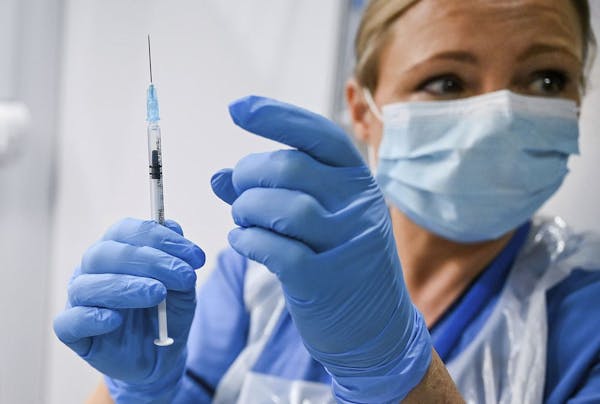Minnesota is reporting 826 new coronavirus cases and 13 more deaths linked to COVID-19, the state Health Department announced Saturday.
The latest numbers mean the seven-day rolling average for net case increases is now 804.7 per day, according to the Star Tribune's coronavirus tracker. The latest average is down slightly from Friday's reading, but up from last Saturday's comparable figure of 766.6 new cases per day.
The statewide tally for people who have received at least one vaccine dose increased by 32,019 in the latest data release, for a total of 836,735 people so far. That's about 15% of the state's population, according to Star Tribune estimates, up from about 13.4% last Saturday.
The Health Department says 430,819 people now have completed the two-dose vaccine series, up from last Saturday's count of 315,284 people. Vaccination figures could understate the total for doses administered due to reporting delays.
Residents of long-term care and assisted-living facilities accounted for eight of the newly announced deaths.
Since Minnesota started detecting virus infections in March, the state has reported 483,790 positive cases, 25,714 hospitalizations and 6,475 deaths.
The state's one-day count of 826 new cases came on a volume of 28,288 newly completed tests, meaning the share of tests coming back positive was again below the state's "caution" level of 5%.
The Star Tribune's tracker shows 31 new hospital admissions reported on Saturday. Daily announcements of new admissions typically include patients who have entered the hospital at some point over the last several days — not just on the most recent day.
The volume of COVID-19 patients in Minnesota hospital beds continues to be low compared with peaks last year.
Numbers released Saturday show health care workers have accounted for 37,744 positive cases. More than 469,959 people who were infected no longer need to be isolated.
Health Department figures on Saturday show a total of 1,269,572 vaccine doses administered, up from last Saturday's count of 1,059,617 total doses.
COVID-19 a respiratory ailment that poses the greatest risk of serious illness in those 65 and older, residents of long-term care facilities and people with underlying medical conditions.
The disease is caused by a coronavirus that surfaced in late 2019. Health problems that boost COVID-19 risk range from lung disease and serious heart conditions to obesity and diabetes.
Most patients with COVID-19 don't need to be hospitalized. Most illnesses involve mild or moderate symptoms; many cases are asymptomatic.
Data released Saturday morning was current as of 4 p.m. Friday.
This is a developing story. Check back for updates.
Christopher Snowbeck • 612-673-4744

Want to share info with the Star Tribune? How to do it securely

'Safe recovery sites' would offer syringes, naloxone and more to people using drugs. The plan could be in peril.
New Minnesota GOP leaders seek peace with party's anti-establishment wing

Who is Republican Lisa Demuth, Minnesota's first House speaker of color?

